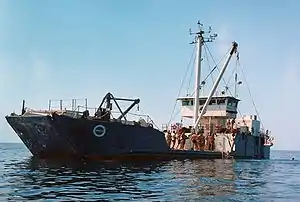MV Retriever
MV Retriever was a World War II-era Landing Craft Utility transferred to NASA from the U.S. Army. It was used to train United States astronauts for post-splashdown ocean recovery operations and water egress from their command modules during the Gemini and Apollo programs from 1963 to 1972. It operated primarily in Galveston Bay and the Gulf of Mexico.
 MV Retriever in October 1966 (Apollo 1 training) | |
| History | |
|---|---|
| Name: | MV Retriever |
| Owner: | NASA |
| Operator: | NASA |
| Builder: | Avondale Shipyards in New Orleans |
| Laid down: | August 1954 |
| Launched: | 1954 |
| In service: | 1954 |
| Out of service: | 1972 |
| Fate: | Transferred to the Virginia Institute of Marine Science (VIMS) |
| General characteristics | |
| Class and type: | LCT Mk 5 |
| Displacement: |
|
| Length: | 114 ft 2 in (34.80 m) |
| Beam: | 32 ft 8 in (9.96 m) |
| Draught: |
|
| Propulsion: | 3 Gray Marine 225 hp (168 kW) diesel engines, triple screws |
| Speed: | 8 knots (15 km/h; 9.2 mph) |
| Range: | 700 mi (1,100 km) |
| Capacity: | 150 short tons (140 t) cargo |
| Complement: | 1 officer, 12 enlisted |
MV Retriever was one of 500 Mk V LCTs built (numbered, not named). LCU-15301 was acquired by NASA under a reimbursable loan agreement dated March 4, 1963, from the U.S. Army at Ft. Eustis, Virginia.[1]
The sides of the vessel's midsection were cut down, a new bridge built and a hoist added for NASA use. It was under the jurisdiction of the Manned Spacecraft Center's Landing and Recovery Division, and its captains included Frank M. Gammon, Sr., CWO, US Army and Dino E. Bernardi, USCG (1971–72).
In 1972, NASA transferred the MV Retriever to the Virginia Institute of Marine Science (VIMS) in Gloucester, Virginia, where it was used to support marine research in the Chesapeake Bay area until it was retired.[2]
Gallery
 Gemini 4 backup crew training, February 25, 1965
Gemini 4 backup crew training, February 25, 1965 Retriever in 1963
Retriever in 1963
References
- "MV Retriever". Navsource.org. May 3, 2013. Retrieved July 3, 2013.
- Jones, Coye Mac (July 24, 2009). "NASA Motor Vessel (MV) Retriever" (PDF). Jonessite.net. Retrieved December 29, 2020.
External links
 Media related to Retriever (ship, 1954) at Wikimedia Commons
Media related to Retriever (ship, 1954) at Wikimedia Commons- Rusnak, Kevin M. (April 16, 2001). "Oral History 2 Transcript: John C. Stonesifer" (PDF). NASA. Archived from the original (PDF) on February 15, 2017.